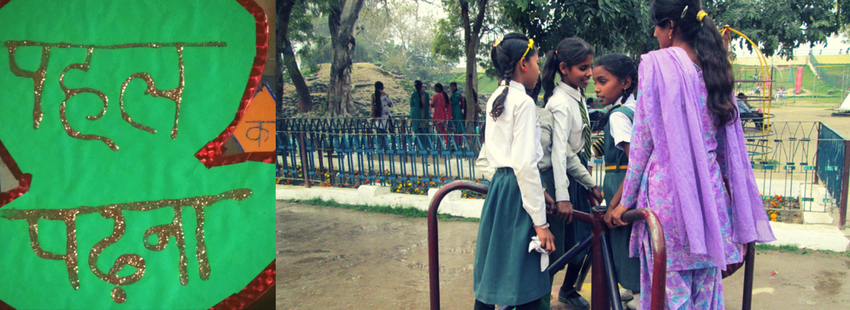Mainstream Education
Nirantar has systematically engaged in mainstream education with a vision to bring a gender and equity perspective within its structure. Gender has, over the last decade, found greater space in State policy and program initiatives, albeit with a narrow focus on increasing girls’ access to education. We see gender as a social structure that impacts girls and boys, as well as transgender individuals.
Nirantar calls for gender to be integral to education, rather than taking the ‘add and stir’ approach. We seek to highlight the importance of looking beyond access, to ensuring that gender is key to all dimensions of education including content and pedagogy — the teaching-learning processes. We strive to achieve this through capacity building of teachers, and creating material in a context and language in which little is available from the rich literature that currently exists in English on gender and education.
Interventions
Engagement with School Curriculum: Government school textbooks produced post the NCERT’s National Curriculum Framework of 2000 were critiqued for containing numerous factual errors and for distorting facts. In this respect, Nirantar undertook a study of school textbooks published both by the government and by private publishers across four states and at the national-level in 2004.
Some of the many questions that were addressed by this study titled ‘Textbook Regimes: A Feminist Critique of Nation and Identity’ were regarding the content, its structure, ideas of femininity and masculinity, and invisibilisation of not just women but other identities.
Writing School Textbooks: In September 2004, NCERT constituted expert groups to review and recommend changes in these textbooks. Nirantar was involved in coordinating a team of teachers and educationists to work together on the Social and Political life textbooks for Classes 6 to 8, published by SCERT, Delhi.
Writing Material for Adolescence Education Programme: Nirantar was intensively involved in the process of revising the Adolescence Education Programme as outlined by NCERT. This engagement involved participation in consultations, a series of working committee meetings, and drafting sections (‘Process of Growing up’) of the training materials for the “Adolescence Education Programme – Training and Resource Materials” NCERT, September 2010.
The revised approach and materials have addressed several problems with the earlier AEP material published in 1999, which tended to view adolescence in a negative light, focusing entirely on problems, dangers and disease, although there is still need for further strengthening.
Gender Training with Teachers and Teacher Educators: Over the years, Nirantar has accumulated experience in training and providing inputs to a range of people involved in the formal system of education, including teachers, planners and gender educators. The focus of our inputs has been on primary and upper primary level teachers, where we often collaborate with Sarva Shiksha Abhiyan in various states to provide intensive inputs around gender.
Content Development: In 2010, we started publishing the Pitara Young Reader series, keeping young people (age group of 10-18 years) and the present context of school educators in mind. Covering a wide range of themes and subject areas from the middle and secondary school curriculum, these booklets supplement the content of the main curriculum, the conceptual framework of the booklets breaks conventional subject boundaries.
Content Analysis: We have worked with various platforms of education ranging from textbook writing to reviewing state textbooks, from capacity building of teachers to writing training modules, critiquing/understanding education policies, and from working on the Right to Education to making sexuality education integral to the curriculum.
- Raipur Textbook Analysis: In collaboration with UNICEF and SCERT, Chhattisgarh, in 2015, we reviewed all the textbooks of class 9th. For the review and content analysis, we used gender, caste, class, sexuality, disability and language as parameters, keeping in mind the diverse context of Chhattisgarh.
- Developing a Module on Sexuality for IGNOU: We developed a unit entitled ‘Constructing Sexuality: Issues’ for the Queer Liberation module for the PG Diploma/MA programme in Women’s and Gender Studies (IGNOU). The unit explains the linkages between sexuality as a social construct, structures of powers, privilege and punishment, not only through theories but also through life stories and fictional accounts, establishing it as a personal yet political concept.
- Enabling Social Auditing of the ‘Right to Education’: We worked with the National Commission for Protection of Child Rights (NCPCR) to build capacities as well as implement the social audit process in schools and at the community level. The social audit included a household survey of each house in the 58 villages of Lalitpur district, UP, to enumerate all children in the age group of 6-14 years. In addition, all the 97 schools were monitored and interviews conducted with head teachers, teachers and Shiksha Mitras (para teachers) to understand the status of school infrastructure and quality of education.
- Advocating for the Significance of Sexuality to be Recognised and Addressed in Secondary Education: We continue to focus on sexuality to be recognised and addressed in secondary education and in this effort we actively advocated against the ban on Comprehensive Sexuality Education (CSE) by the government in 2007. Our publication ‘Sexuality Education for Young People’ documents the perspectives and recommendations which demanded the need for CSE.
- Gender Sensitization Workshops in Government Schools: In 2016, Nirantar got the opportunity to work with students from senior secondary government schools. This was a continued effort by Delhi Police, to work towards gender sensitization in school spaces.

